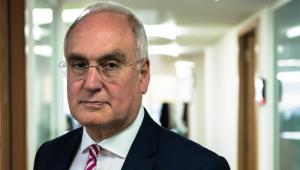In a speech to the London Councils’ Education Summit yesterday, the chief inspector of schools said London was leading the way in narrowing the attainment gap between rich and poor students.
There has been speculation that prime minister Theresa May could end the ban on new grammar schools in a bid to boost social mobility.
Wilshaw said the notion that poorer pupils would benefit from the return of grammar schools “strikes me as quite palpable tosh and nonsense” and was refuted by the experience in London.
The capital has maintained its status as the top performing region across all key stages for children eligible for free school meals.
“As someone who has spent their entire professional career in this city, I never cease to be amazed by the transformation that London schools have undergone since the miserable decades of the 1970s, 1980s and 1990s when they were truly bottom of the national pile,” Wilshaw stated.
The “soaring success” of London schools showed what improvements in attainment were possible.
“The question I would put to those clamouring for a return to selection by ability at the age of 11 is this: if grammar schools are the great answer, why aren’t there more of them in London? If they are such a good thing for poor children, then why are poor children here in the capital doing so much better than their counterparts in those parts of the country that operate selection?”
Wilshaw said he appreciated that many grammar schools do a fine job in equipping their students with an excellent education, but their record of admitting children from non-middle-class backgrounds is “pretty woeful”.
In addition, the reintroduction of a grammar school in every town would also mean three secondary moderns in every town – a consequence rarely mentioned. “That is why I am in no doubt that a return to selection would be a profoundly retrograde step that would actually lead to overall standards sliding back, not improving,” he concluded.
“Only now are we really starting to see the long-term impact of the education reforms that were embarked on under Tony Blair’s premiership and carried on by Michael Gove and his successors. Why jeopardise these nascent but welcome signs of progress by turning back the clock?”
In a statement released after the conference, London Councils’ executive member for children, skills and employment Peter John said the capital’s schools had much to celebrate.
However, they would not rest on their laurels. “By analysing what drives success in schools across the capital and focusing on narrowing gaps in attainment for pupils on free school meals, who are classed as being the most disadvantaged, boroughs can pave the way for further school improvements.
“London boroughs remain committed to playing our part within the education system to ensure children in London receive a top-quality education, and that is why we are so concerned about the likely impact of the national funding formula for schools, on top of rising costs and growing pupil populations.”



















